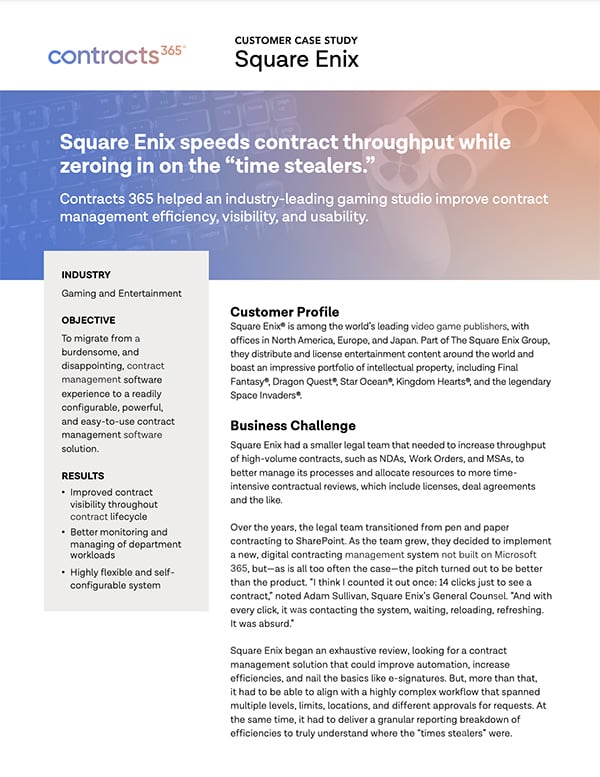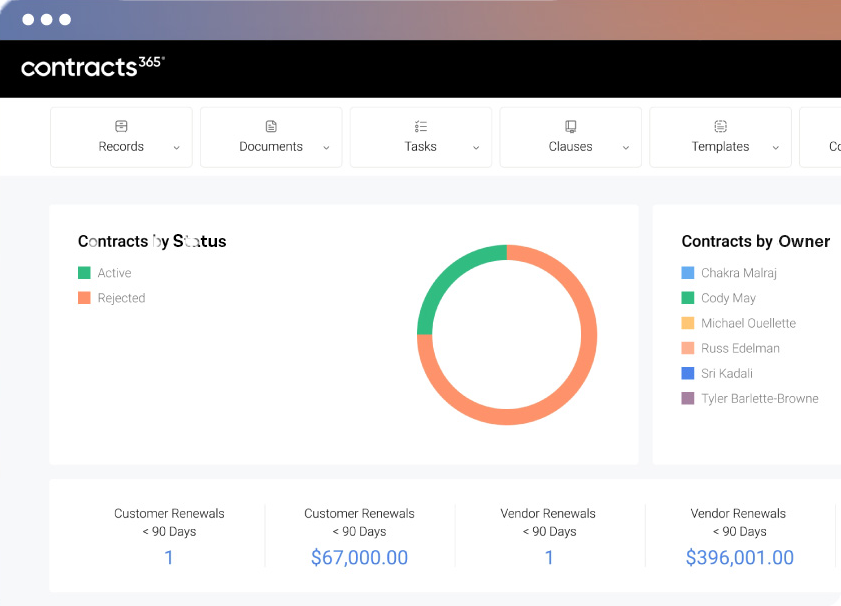Four Essential Features of an Effective Contract Repository
Centralized contract repositories are revolutionizing the way businesses organize, access, and even negotiate their contracts. Today’s repositories provide secure, cloud-based storage and a single source of intelligence for detailed information about each contract at every stage of its lifecycle. With unprecedented visibility into your contract library, your business can optimize your negotiation process, reduce risk, enhance compliance, and cut the amount of time your staff spends on tedious administrative tasks. In this article, we’ll explore the benefits of contract repositories, key features to look for, and the importance of a reliable, easily searchable central repository for all contracts.
What is a contract repository?
Put simply, a contract repository is anywhere contracts are stored. Traditionally, this was a file cabinet. Even when businesses started storing files digitally, they could be saved on different devices in various iterations, making it challenging for individual team members to quickly access key information. Today, more and more businesses are implementing cloud-based centralized contract repositories. These provide a simple way for businesses to keep, organize, and manage contracts throughout the lifecycle, saving time and money while reducing risk in business transactions.
A centralized repository not only streamlines the contract management process, but it also helps businesses reduce errors, increase compliance, and free their teams from time-consuming tasks. It can enable permissions based on user roles, allowing easy access for all stakeholders. Robust security features protect sensitive data while providing essential players seamless access when and where they need it—a necessity in today’s environment of widespread remote work and increasingly complex cyber threats.
Do I really need a centralized repository?
Various people in your company, including sales and procurement teams, counsel, executives, and others, need access to accurate contract information to do their jobs as effectively as possible. If they lack a single source of intelligence about your organization’s contracts, several problems can quickly arise, including uncertainty about which version is current, missed renewals, and inconsistency across contracts. Without an easy way to track obligations, companies risk breach and the financial and reputational losses that can follow. One consequence of clinging to legacy contract management systems is certain, however: wasted human resources.
How does a centralized repository streamline contract management?
In many companies, it can take significant staff time to simply locate completed contracts. Sometimes, they might not be found at all. Even if contracts can be accessed quickly, when different employees need various types of contract information, the process of locating and transmitting that information can put considerable strain on contract managers’ time.
Contract generation and negotiation are much more time-consuming processes that involve collaboration, sometimes among multiple individuals across organizations. To avoid errors and inconsistencies, negotiators must have clear guidance about approved language and key terms. A central repository can make this information easily accessible, allowing negotiators to move quickly and confidently through the process.
Even when negotiators have all the information they need to draft or approve a contract, the back and forth required throughout the process can be cumbersome and create significant delays. Fortunately, centralized contract repositories are capable of more than just putting contract data at your team’s fingertips. They also facilitate collaboration and negotiation by making it easy for all parties to access the current version of a contract and notifying individuals when they need to take action before the process can move forward. They can even be integrated with e-signature tools to further expedite the process.
Download the Square Enix Case Study
Download Now
What should I look for in a contract repository?
A reliable, highly efficient contract repository must have robust security features, easy accessibility for those who need it, complex search and retrieval functionality, and the ability to track the entire history of a contract, from first draft to signed document. Below, we’ll explore each of these four features in more detail.
1. Easy Accessibility
The right contract repository will make it easy for all parties to access contracts from anywhere at any time to support remote work and streamlined collaboration. It should provide visibility into each document’s series of iterations, what steps are next in the process, and who needs to take action. This eliminates the need for confusing email threads or multi-party chats (which can take substantial staff time to pore through), helps ensure everyone stays up to speed, and keeps the process moving along.
Accessibility requires more than just making data available; an effective contract repository should also be easy for all parties to use. Select a solution with an intuitive interface that minimizes steps. If you have to spend large amounts of time training staff on the new software or they have to wait for several slow-loading pages on the way to the information they need, this will immediately undermine the cost savings a repository can generate. Additionally, it should allow users to view, approve, and sign documents on any device—desktop, laptop, or mobile.
2. Powerful Search & Retrieval
Modern contract repository software can integrate AI functionality to provide complex, powerful search and retrieval capabilities. Businesses can store meta data like key terms, contract types, renewal dates, specific clauses, and more to create a whole new level of organization for their contracts. Users can examine individual contracts or search the database for the information they need. This can help negotiators optimize contract terms and ensure consistency of language. Additionally, others can be given access that allows them to retrieve the information they need without having to request it through the contract management team. This can help your team stay on top of deadlines, renewal or cancellation dates, and deliverables, reducing risk and enhancing contract compliance.
3. Version Control
Version control is essential for understanding the history of a contract, who took what actions in its development, and ensuring all changes are properly reviewed and approved. A contract repository should make it easy to view and compare all versions of a contract, zero in on changes, ensure consistency, and hold everyone accountable. This will speed the negotiation and approval processes while reducing errors and inconsistencies.
4. Robust Security Features
When digitally storing your company’s sensitive information, security is a primary concern. You need to protect your contract database from a wide range of threats, from natural disasters to hackers. Make sure the contract management software you choose has the following capabilities:
- Ensure the confidentiality of your company’s financial data, trade secrets, and other intellectual property as well as parties’ personally identifiable information.
- Meet the requirements of all data privacy regulations and industry standards that apply to your business and those you contract with.
- Provide a secure platform that facilitates collaboration and negotiation.
- Provide easily configurable access control to ensure only those who need access can get it, and those who need it can get access easily.
- Ensure continuous access to your contract information, including regular data backup and disaster recovery protocols.
- Protect against tampering, ransomware, and other types of hacking with multi-layered security features.
- Continuously monitor for threats and send alerts to key employees.
Powerful security features are vital in contract management software to safeguard sensitive information, ensure regulatory compliance, avert data breaches, and maintain trust in your business. Make sure to stay on top of all security updates to keep your data protected.
A centralized contract repository reduces risk to your business.
An effective centralized contract repository reduces risk on several levels. By providing unprecedented visibility into contract terms, it helps ensure everyone is aware of their obligations, reducing the risk of breach. Strong, layered security reduces the risk of noncompliance with data privacy requirements. Configurable notifications can help avert legal and financial risks associated with missed deadlines, lapsed (or overlapping) contracts, or continuing to pay for services that are no longer needed.
Contract Management Built for Microsoft 365
Contracts 365 is contract management software that’s built for Microsoft 365. It allows you to use your existing Microsoft 365 subscription and the Microsoft cloud architecture, so you can get more out of your existing IT investment. Its contract repository is secured by the proven protection of Microsoft's best-in-class security infrastructure, including Defender, Endpoint Manager, and more to ensure sensitive information is safeguarded. An intuitive interface, cloud-based infrastructure, and seamless eSignature integration make it easy to access, edit, approve, and sign documents, including detailed version history to compare changes across each iteration of a contract. Contracts 365's built-in search and retrieval function also leverages Microsoft’s AI capabilities to help you locate documents, ensure consistent language, and retrieve information with ease.
To learn more about how effective contract management can improve your business practices, reduce risk, and support your bottom line, check out our insights, including blog articles, ebooks, webinars, and more. To get a look at how we’ve supported businesses like yours, read our case studies or request a demo so we can show you how it works in real time.
